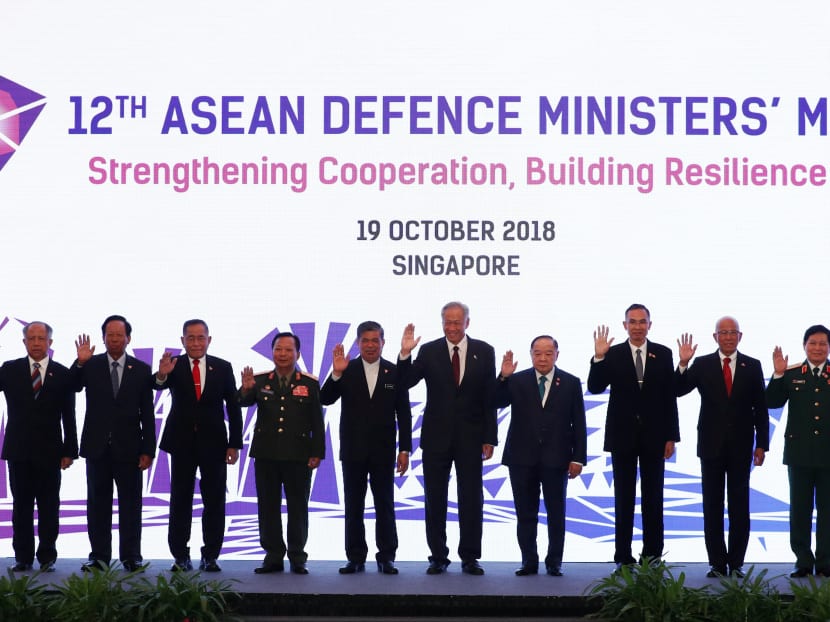First ever multilateral guidelines adopted to prevent military air incidents in the region
SINGAPORE — South-east Asian countries concluded a set of guidelines for unplanned air encounters between their military aircraft on Friday, (Oct 19), the first multilateral document designed to reduce the risk of miscalculations and de-escalate tensions in the air.

The Guidelines for Air Military Encounters (Game) build on a Code for Unplanned Encounters at Sea (Cues), which was first adopted back in 2014.
SINGAPORE — South-east Asian countries concluded a set of guidelines for unplanned air encounters between their military aircraft on Friday, (Oct 19), the first multilateral document designed to reduce the risk of miscalculations and de-escalate tensions in the air.
The Guidelines for Air Military Encounters (Game) build on a Code for Unplanned Encounters at Sea (Cues), which was first adopted back in 2014.
Speaking at a joint press conference after the signing of the joint declaration for the 12th Association of South-east Asian Nations (Asean) Defence Ministers’ Meeting (ADMM), Defence Minister Ng Eng Hen said: “This is a significant achievement which demonstrates our leadership to enhance peace and security in our region".
The guidelines, which are not legally binding, aim to ensure safe separation between military aircraft over the high seas so as to avoid creating safety hazards, among other things.
The eight ADMM-Plus dialogue partners - Australia, China, India, Japan, New Zealand, South Korea, Russia and the United States - will have the option of adopting Game.
“We will put it (Game) to the plus partners, but it is significant that we have unanimous agreement on the guidelines… It is slightly more difficult than Cues I presume because the (air) encounters in terms of time and space, are much more compressed,” said Dr Ng.
When asked if Cues has been effective in preventing incidents, especially in the South China Sea, Dr Ng noted that without guidelines for military sea and air encounters, there will be increased risk of mishaps.
“In a way they are like seatbelts, not completely protective but at least they provide some protection,” he said.
Game falls under the ambit of establishing more practical confidence-building measures, which is a key pillar of Singapore’s ADMM chairmanship this year.
Asean and China will be holding a maritime exercise next week, after a successful table top exercise in August.
Meanwhile, Asean and the US announced on Friday that they will hold a maritime exercise next year. A press release issued by the Ministry of Defence said that both Dr Ng and American defence secretary James Mattis “welcomed the exercise as a useful confidence-building measure that would build the capacity of and enhance cooperation between regional navies”.
In 2014, Cues was adopted by the US, China, eight Asean member states and 11 other Pacific nations.
While Cues is not legally binding, it spells out a standardised framework of safety procedures, basic communications and manoeuvring instructions for naval ships and aircraft to follow during unplanned encounters at sea.
Last year, Cues was adopted by all 18 countries at the ADMM-Plus.
There have been signs of tensions in the South China Sea over China’s missile deployment, test flights and island building in the area. China claims most of the waters and has been building runways and other infrastructure on artificial islands to bolster its title.
The US does not recognise China’s claims. In recent months, the US has sailed warships and flown military aircraft near the Chinese outposts to assert its right to freedom of navigation and assure unimpeded passage through the region, where Vietnam, Malaysia, Brunei, the Philippines and Taiwan have rival claims.
Just last month, Pentagon flew B-52 bombers in the vicinity of the South China Sea as part of what it called a “regularly scheduled, combined operation”, drawing Beijing’s ire.
Other pillars of Singapore's ADMM chairmanship include counter-terrorism and bio-chemical threats.
In this regard, the defence chiefs also agreed to enhance strategic information-sharing on counter-terrorism, as well as to form a network of chemical, biological, and radiological defence experts to share best practices and make quick contact during crises.
Singapore hands over the ADMM chairmanship to Thailand on Saturday, after the meeting with the dialogue partners.









